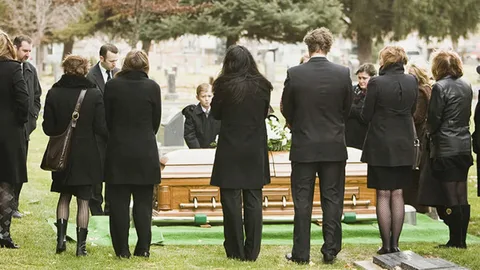Organizing a small funeral can be challenging. There are many decisions to make, and the emotional stress can be overwhelming.
Start by creating a list of people who need to be informed about the service. Then, recruit family and friends to help you spread the word about the funeral.
Planning a memorial service
A memorial service is a special way to celebrate the life of a loved one. It can be held several weeks after their death, or even just days after burial. Many people choose to hold a memorial service because it provides flexibility in terms of time and organization. It can be as informal or formal as the family and friends prefer.
As you begin planning the service, make sure to decide on a theme that reflects your loved one’s life and values. This will help you determine what types of decorations, readings, and music are appropriate to use.
Another important part of planning obituary programs and a memorial service is choosing someone to conduct the event. This can be a friend, family member, or religious leader. Regardless of whom you select, it’s important to make sure they are comfortable with public speaking and the responsibility that comes with leading a funeral or memorial service.
When planning a memorial service, it is often best to contact those who would like to speak at the service well in advance so that they have plenty of time to prepare their thoughts. Ask them if they have any special equipment they need, such as a microphone or video screen.
If your deceased loved one was in the military, consider having their flag or squadron anthem played at the start of the ceremony to honor their service. You can also display their service banners and small military-themed tokens to show your respect for them.
You can also create a slideshow of photos or videos of your deceased loved one and play them during the memorial service. This will allow people to relive their favorite memories and take home a tangible reminder of their loved one’s life.
Music is another important part of a memorial service, and it can be incredibly personal to your loved one’s tastes. Think about putting together a playlist of songs they enjoyed, or hire a musician to perform a special song at the event.
The last thing you want is for the service to feel impersonal. Keeping the service open and inviting guest participation will add meaning and enrich the experience of everyone involved. You can invite guests to write a note to the deceased, place it in a memory box, or give them a moment to share their own stories and prayers.
Choosing a venue
Funerals are an important part of a person’s life, and they are often one of the most stressful times for families. Planning the service and memorial of a loved one can be particularly challenging, but finding the right venue is an equally important part of this process.
When choosing a funeral venue, it’s essential to consider many factors. You want to find a space that will provide all the necessary amenities for the event, and you should also choose a venue that can accommodate the number of people who will be attending.
If you’re arranging a small funeral, there are some alternative venues that you can consider. Some of these include public parks, family homes, and other places that are close to your loved one’s heart.
Other alternatives to traditional funeral venues are private events spaces or smaller chapels, where you can have a more intimate gathering. These options offer a great way to honor the memory of your loved one and give guests a chance to say their last goodbyes.
The ambiance of the event space is also an important factor to consider. The space should feel cozy, comfortable, and inviting, and it should be in a location that’s conducive to socializing and remembering the deceased.
In addition, the acoustics of the venue are important to consider. It’s best to avoid a space that has a low ceiling, as it can make the sound of eulogies and speeches too loud. On the other hand, a high ceiling can add an air of elegance to the memorial.
Lastly, it’s important to check the venue’s insurance policy. This is important to ensure that you have adequate coverage should anything go wrong during the event.
Organizing a small funeral can be stressful, but it doesn’t have to be difficult. With a little planning and preparation, you can organize a funeral that is both affordable and in keeping with the wishes of your loved one. By following these steps, you can arrange a small funeral that will be both beautiful and memorable for everyone involved.
Organizing a reception
Many people host a reception after a funeral to give their friends and family a chance to celebrate the life of a loved one. These events are a great way to bring everyone together and remember the deceased in a more relaxed and informal setting.
A funeral reception can be organized at any venue, from a home to a church hall or banquet room. Choosing a location is important as it determines the type of food you will serve, as well as the amount of space needed for guests to sit comfortably. You also need to consider how many people will be attending the reception.
The number of guests will depend on whether you are planning a memorial service for an immediate family member or extended friends. Then, think about any former employers or associates, as well as other groups the deceased belonged to, such as service clubs, associations, unions, and sports teams.
In general, the more people you can expect to attend the reception, the better. For example, if the reception is being held at a restaurant that the deceased loved to frequent, it would be ideal to make sure that a large number of people can attend and get a good meal.
Depending on the location and time of day, you may need to provide a variety of foods. For example, you might want to offer lighter options at a morning ceremony and more substantial meals at a dinner reception later in the day.
As with any other event, you should carefully choose a menu that is comfortable, affordable, and practical. This will ensure that all of the people who attend can enjoy the reception and feel included.
You should also be sure to provide plenty of water and snacks, as these can help people stay hydrated and refreshed. If possible, you should also supply a place for people to wash their hands before eating or drinking.
Another way to make the reception more fun is to decorate it with tokens of your loved one’s life. For example, if your loved one was a baseball fan, you might put a glove and ball on display. You can also create a table where people can leave their own mementos of your loved one.
Organizing a burial or cremation
As with any important life event, funerals are a very personal process. They reflect your relationship with the person who died, what he or she wanted, and how you want to honor his or her memory. They are also a time for family and friends to gather together and say goodbye.
Whether you’re planning your own funeral or someone else’s, it’s essential to take the time to think through all of the different aspects of the ceremony. This can help you to choose the type of burial or cremation that will best suit your needs and budget, as well as the types of items that will be included in the funeral.
You can also make it easy for those who are arranging the funeral to follow your wishes by creating a legal document known as a Durable Power of Attorney for Health Care (DPOAHC). A DPOAHC is a document that gives a designated agent the ability to make medical decisions on your behalf, and it’s often considered the most effective way to ensure that your final arrangements are made according to your own wishes.
After you’ve made your DPOAHC, it’s important to take the next steps. It’s a good idea to get copies of your DPOAHC from the funeral home, your primary care doctor, and the hospital where you would be taken in case of an emergency, as well as from the people who will be handling your financial and estate matters.
It can also be a good idea to have a conversation with those who will be making the arrangements about what they expect from you. They may have heard the deceased talk about specific things that they wanted, or they might be able to provide you with a list of instructions that they left behind.
Ultimately, a funeral is a difficult time for everyone involved. Having the time to talk about your plans ahead of time can make it easier for you and those who are planning the funeral to focus on what’s important. It’s also a good idea to discuss your plans with those who are most close to the person who passed away so that they can offer any support that you might need during this difficult time.





